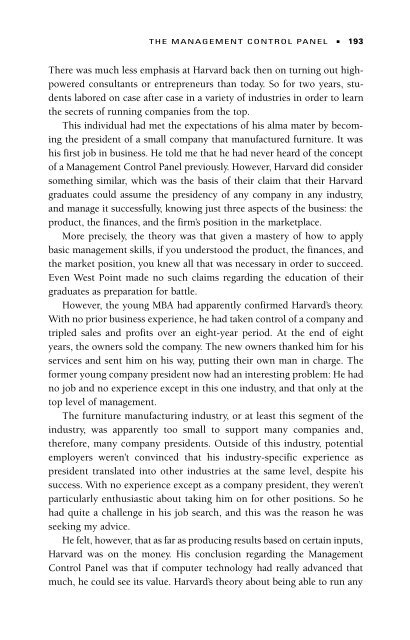A Class with Drucker - Headway | Work on yourself
A Class with Drucker - Headway | Work on yourself
A Class with Drucker - Headway | Work on yourself
You also want an ePaper? Increase the reach of your titles
YUMPU automatically turns print PDFs into web optimized ePapers that Google loves.
THE MANAGEMENT CONTROL PANEL ■ 193<br />
There was much less emphasis at Harvard back then <strong>on</strong> turning out highpowered<br />
c<strong>on</strong>sultants or entrepreneurs than today. So for two years, students<br />
labored <strong>on</strong> case after case in a variety of industries in order to learn<br />
the secrets of running companies from the top.<br />
This individual had met the expectati<strong>on</strong>s of his alma mater by becoming<br />
the president of a small company that manufactured furniture. It was<br />
his first job in business. He told me that he had never heard of the c<strong>on</strong>cept<br />
of a Management C<strong>on</strong>trol Panel previously. However, Harvard did c<strong>on</strong>sider<br />
something similar, which was the basis of their claim that their Harvard<br />
graduates could assume the presidency of any company in any industry,<br />
and manage it successfully, knowing just three aspects of the business: the<br />
product, the finances, and the firm’s positi<strong>on</strong> in the marketplace.<br />
More precisely, the theory was that given a mastery of how to apply<br />
basic management skills, if you understood the product, the finances, and<br />
the market positi<strong>on</strong>, you knew all that was necessary in order to succeed.<br />
Even West Point made no such claims regarding the educati<strong>on</strong> of their<br />
graduates as preparati<strong>on</strong> for battle.<br />
However, the young MBA had apparently c<strong>on</strong>firmed Harvard’s theory.<br />
With no prior business experience, he had taken c<strong>on</strong>trol of a company and<br />
tripled sales and profits over an eight-year period. At the end of eight<br />
years, the owners sold the company. The new owners thanked him for his<br />
services and sent him <strong>on</strong> his way, putting their own man in charge. The<br />
former young company president now had an interesting problem: He had<br />
no job and no experience except in this <strong>on</strong>e industry, and that <strong>on</strong>ly at the<br />
top level of management.<br />
The furniture manufacturing industry, or at least this segment of the<br />
industry, was apparently too small to support many companies and,<br />
therefore, many company presidents. Outside of this industry, potential<br />
employers weren’t c<strong>on</strong>vinced that his industry-specific experience as<br />
president translated into other industries at the same level, despite his<br />
success. With no experience except as a company president, they weren’t<br />
particularly enthusiastic about taking him <strong>on</strong> for other positi<strong>on</strong>s. So he<br />
had quite a challenge in his job search, and this was the reas<strong>on</strong> he was<br />
seeking my advice.<br />
He felt, however, that as far as producing results based <strong>on</strong> certain inputs,<br />
Harvard was <strong>on</strong> the m<strong>on</strong>ey. His c<strong>on</strong>clusi<strong>on</strong> regarding the Management<br />
C<strong>on</strong>trol Panel was that if computer technology had really advanced that<br />
much, he could see its value. Harvard’s theory about being able to run any


